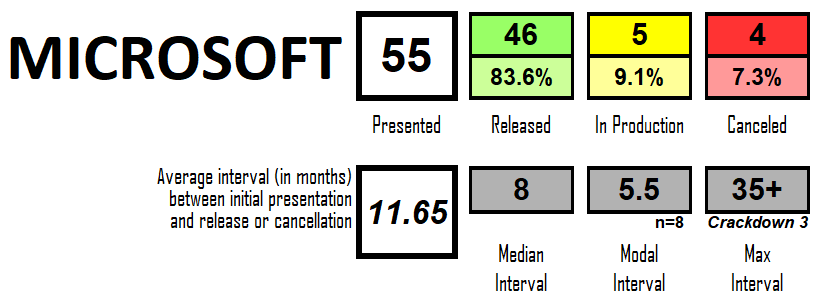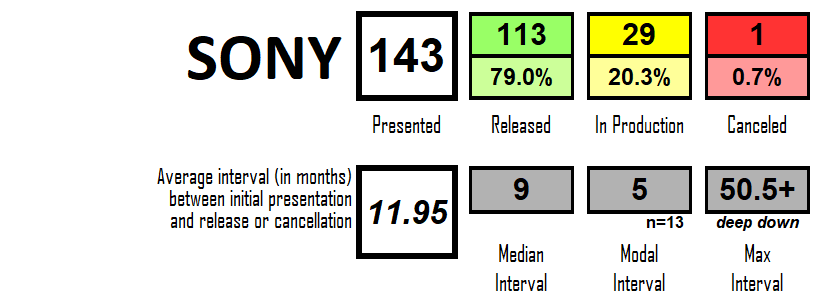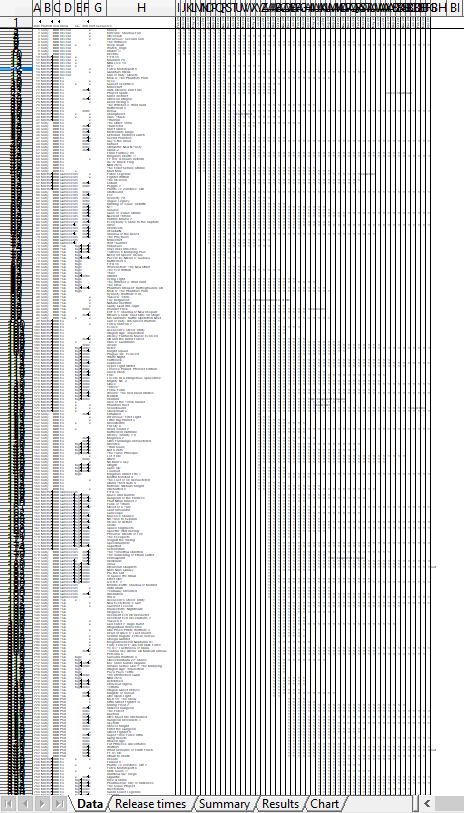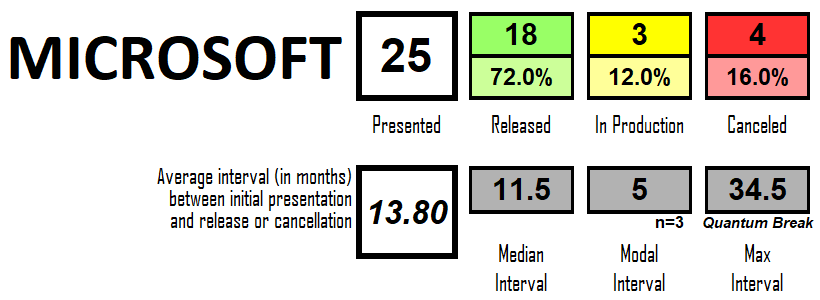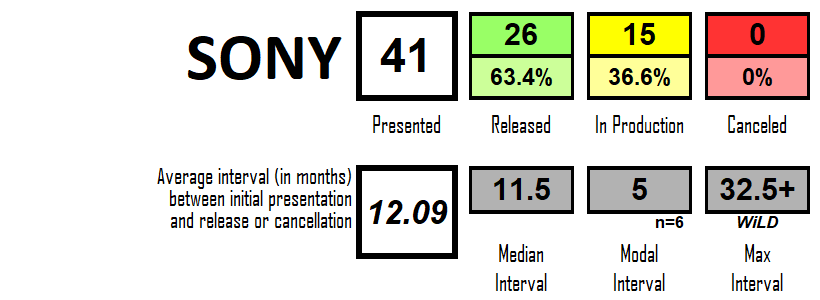Liabe Brave
Member
Introduction
With E3 not many weeks away, of course there's talk about what new games will be announced there, and which ones we'll see return from last year. The lengthy development times and repeated public showcases of games this generation have been discussed at length on GAF.
Which made me curious. Exactly how long has it been taking games to come out after they're presented? Several major points appear to be generally agreed upon:
Method
I watched the unedited streams of every major conference for PS4 and Xbox One from 2013 through 2016. This included the reveal events, as well as all keynotes from E3, Gamescom, Paris Games Week, Tokyo Game Show, and the PlayStation Experience. I counted each title shown, the first time they appeared.
For these purposes, "shown" means displayed footage with an associated title. This includes videos showing multiple games one after the other, but does not include sizzle reels (i.e. intercut dramatic shots of unlabeled games, assembled into a single trailer with a hype soundtrack). I also didn't count logos presented without video, or mentions by a speaker with nothing onscreen.
By "the first time they appeared", I don't mean only new game announcements. Even if a title is already known about before being shown at a conference, they're still part of the time lag between initial formal presentation and final release. However, if the same game appeared on both Microsoft and Sony's stages, I only counted the first showing.
Results
Here are the results of my survey (all data as of May 1, 2017). The top row for each platform lists the total number of titles shown, followed by the counts and percentages that have released, are still being worked on, or have been officially canceled. The second row is the data we were looking for: the average, median, modal, and maximum intervals between presentation and release (or cancellation).
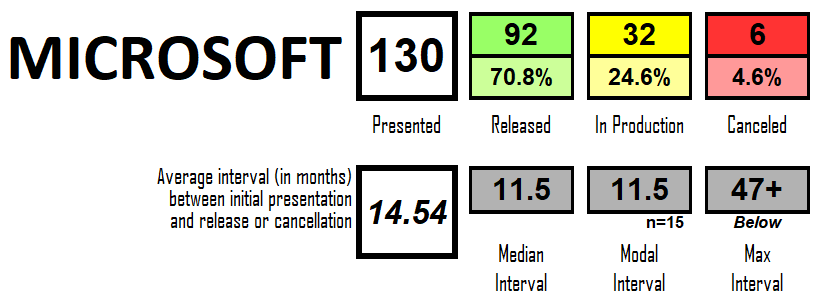
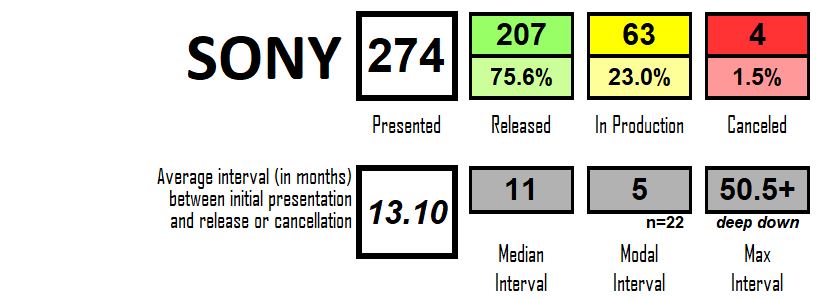
Immediately, one fact leaps out: Microsoft has a longer average interval to release than Sony, not shorter. This is a completely counterintuitive result, directly contradictory to what I expected (and I suspect, what most others would expect). And it's not just a few long-term titles dragging the average up: Microsoft's median and modal intervals are also higher.
It's important to note that the real intervals between presentation and release will be longer than listed above. That's because recently-shown games can only have short gaps, even though in the fullness of time they may release long after being presented (e.g. The Last of Us Part II currently has a 5 month interval, though its final value will be much higher). Since Sony presents so many more games, this effect will be bigger for them. Could that explain the weird results?
No, it can't. I chopped off two years of conferences, pretending that E3 2015 was the last time either platform presented any games. This did reduce the gap (and as predicted raise both values), but Sony still remained lower:14.87 months versus Microsoft's 15.49 months. Persistently, for years, Xbox One games take longer to come out on average, the midpoint of its release intervals is longer than PS4's, and its most common interval is more than twice as long as PS4's.
How can the mismatch between these facts and public opinion be explained? Well, I have more data and analysis to share. But I don't want to just infodump and cut off discussion before it even begins. Plus, there could easily be things I haven't thought of which you'll hit on.
So there's a start, GAF. I'd love to hear your comments and questions.
With E3 not many weeks away, of course there's talk about what new games will be announced there, and which ones we'll see return from last year. The lengthy development times and repeated public showcases of games this generation have been discussed at length on GAF.
Which made me curious. Exactly how long has it been taking games to come out after they're presented? Several major points appear to be generally agreed upon:
- Some games seem to be revealed too early, as evidenced by CG trailers when gameplay isn't ready
- Games get shown for multiple years before they actually come out
- The AAA blockbusters are especially prone to lengthy dev time
- Sony is worse about announcing early than Microsoft or Nintendo
Method
I watched the unedited streams of every major conference for PS4 and Xbox One from 2013 through 2016. This included the reveal events, as well as all keynotes from E3, Gamescom, Paris Games Week, Tokyo Game Show, and the PlayStation Experience. I counted each title shown, the first time they appeared.
For these purposes, "shown" means displayed footage with an associated title. This includes videos showing multiple games one after the other, but does not include sizzle reels (i.e. intercut dramatic shots of unlabeled games, assembled into a single trailer with a hype soundtrack). I also didn't count logos presented without video, or mentions by a speaker with nothing onscreen.
By "the first time they appeared", I don't mean only new game announcements. Even if a title is already known about before being shown at a conference, they're still part of the time lag between initial formal presentation and final release. However, if the same game appeared on both Microsoft and Sony's stages, I only counted the first showing.
Results
Here are the results of my survey (all data as of May 1, 2017). The top row for each platform lists the total number of titles shown, followed by the counts and percentages that have released, are still being worked on, or have been officially canceled. The second row is the data we were looking for: the average, median, modal, and maximum intervals between presentation and release (or cancellation).


Immediately, one fact leaps out: Microsoft has a longer average interval to release than Sony, not shorter. This is a completely counterintuitive result, directly contradictory to what I expected (and I suspect, what most others would expect). And it's not just a few long-term titles dragging the average up: Microsoft's median and modal intervals are also higher.
It's important to note that the real intervals between presentation and release will be longer than listed above. That's because recently-shown games can only have short gaps, even though in the fullness of time they may release long after being presented (e.g. The Last of Us Part II currently has a 5 month interval, though its final value will be much higher). Since Sony presents so many more games, this effect will be bigger for them. Could that explain the weird results?
No, it can't. I chopped off two years of conferences, pretending that E3 2015 was the last time either platform presented any games. This did reduce the gap (and as predicted raise both values), but Sony still remained lower:14.87 months versus Microsoft's 15.49 months. Persistently, for years, Xbox One games take longer to come out on average, the midpoint of its release intervals is longer than PS4's, and its most common interval is more than twice as long as PS4's.
How can the mismatch between these facts and public opinion be explained? Well, I have more data and analysis to share. But I don't want to just infodump and cut off discussion before it even begins. Plus, there could easily be things I haven't thought of which you'll hit on.
So there's a start, GAF. I'd love to hear your comments and questions.

